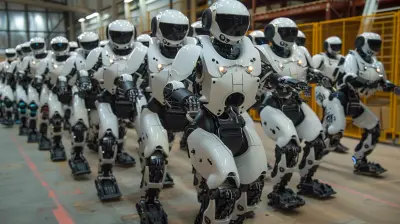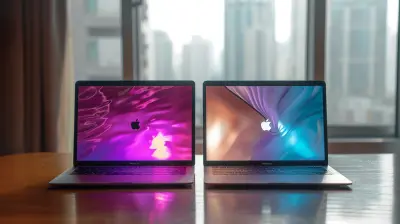8 February 2025
In the last few decades, technology has evolved at an incredible pace, rapidly reshaping the way we live, work, and even think. But while many of us are focused on the latest smartphone or the next-gen gaming console, something bigger is happening behind the scenes. Tech startups are shaking things up, disrupting traditional industries, and changing the game in ways that were once unimaginable.
Let’s be honest, disruption isn’t a new concept. Industries have been transformed before—just think about how cars replaced horse-drawn carriages. But what we’re seeing now is different. The speed, scale, and scope of disruption brought by tech startups today is unprecedented. From finance to healthcare, transportation to retail, and beyond, tech startups are not just tweaking the system; they’re flipping it on its head.
In this article, we’ll dive deep into how tech startups are disrupting traditional industries, why they’re so successful, and what this means for the future. Buckle up—this is going to be a thrilling ride!

What Does "Disruption" Really Mean?
Before we get too deep, let’s clarify what we mean by "disruption." When we talk about disruption in the context of tech startups, we’re referring to a process where new companies or technologies challenge established businesses and practices.Think of it as a David vs. Goliath scenario. Except, in this case, David has a killer app or an unbeatable algorithm. Tech startups leverage innovation, agility, and often a deep understanding of customer pain points to change how industries operate—sometimes entirely.
Disruption doesn’t just mean doing things differently; it means doing things better, faster, or more efficiently. And for traditional industries that have been doing things a certain way for decades (or even centuries), this can be a serious wake-up call.

Why Are Tech Startups So Good at Disruption?
So, what’s the secret sauce? Why are tech startups so good at shaking up industries that have been around forever? Well, it’s a mix of several factors:1. Agility and Speed
Traditional companies often move like oil tankers—slow and steady, with lots of bureaucracy and layers of approval. On the other hand, tech startups are more like speedboats—fast, nimble, and ready to pivot at a moment’s notice. This agility allows them to experiment, fail, learn, and iterate quickly. They’re not bogged down by old-school thinking or outdated processes, giving them a huge advantage when it comes to innovation.2. Leverage of Emerging Technologies
Tech startups are often born out of new, emerging technologies. Whether it's artificial intelligence (AI), blockchain, or the Internet of Things (IoT), these companies are usually the first to harness the power of cutting-edge tech. When a startup builds its entire business model around a technology that an established company is still trying to understand, disruption is almost inevitable.3. Customer-Centric Mindset
Many traditional industries have historically focused more on profit margins and shareholders than on their customers. Tech startups, on the other hand, often make customer experience their number one priority. They use data to understand customer pain points and design solutions that are intuitive, accessible, and—most importantly—what people actually want.4. Scalability
Tech startups have a unique ability to scale quickly. Thanks to the internet, cloud computing, and digital platforms, a startup can go from serving a few hundred users to millions in a short amount of time. This scalability allows them to grow rapidly without needing the same level of infrastructure or resources as traditional companies.
Industries Being Disrupted by Tech Startups
Now that we understand why tech startups are so good at disruption, let’s look at some specific industries that are feeling the heat.1. Finance (FinTech)
One of the industries where disruption has been the most visible is finance. For years, traditional banks operated with minimal competition, offering services like loans, savings accounts, and mortgages with little innovation. Then came fintech.Fintech startups like PayPal, Square, and Stripe have introduced a wave of technological advancements that make banking more accessible, quicker, and often cheaper. Peer-to-peer lending platforms such as LendingClub have opened up new avenues for borrowing and lending, while Robo-advisors have made investing more accessible to the average person.
Perhaps the biggest disruptor in the finance world is cryptocurrency. Bitcoin, Ethereum, and other blockchain technologies have challenged the very concept of money and banking, offering decentralized alternatives to traditional financial systems.
2. Healthcare (HealthTech)
Healthcare is another industry being reshaped by technology. Traditional healthcare systems have long been criticized for being slow, expensive, and inaccessible. Enter healthtech startups, which are working to democratize healthcare and improve patient outcomes.Startups like Teladoc and Lemonaid Health are revolutionizing the way we access medical care by offering online consultations and prescriptions. Wearable tech, like Fitbit and Apple Watch, allows users to monitor their health in real-time, while AI-driven diagnostic tools are helping doctors make faster, more accurate diagnoses.
In short, healthcare startups are making it easier, faster, and more affordable to get the care we need, often without stepping foot in a hospital or clinic.
3. Transportation (MobilityTech)
Traditional transportation models have been upended by tech startups. Companies like Uber and Lyft have entirely transformed the taxi industry by introducing ride-hailing apps that allow users to book rides on demand. But that’s just the beginning.Self-driving car startups like Waymo and Tesla are working to make autonomous vehicles a reality, which could revolutionize not just personal transportation but also logistics and shipping. Electric scooter companies like Bird and Lime have introduced micro-mobility solutions that are changing how we think about short commutes in urban areas.
These startups are not just improving how we get from point A to point B; they’re reimagining the entire transportation ecosystem.
4. Retail (E-commerce)
The retail industry has been one of the hardest hit by tech disruption. Traditional brick-and-mortar stores have struggled to compete with the rise of e-commerce giants like Amazon and Alibaba. These companies have redefined the shopping experience, offering convenience, variety, and fast shipping that traditional retailers often can’t match.But it’s not just big players like Amazon that are shaking things up. Smaller e-commerce startups are also playing a role. Companies like Shopify have made it easier than ever for individuals and small businesses to set up their own online stores, while subscription box services like Birchbox and Dollar Shave Club have introduced entirely new business models.
The retail landscape is changing fast, and those who don’t adapt risk being left behind.
5. Real Estate (PropTech)
Real estate has traditionally been a slow-moving industry, but tech startups are speeding things up. PropTech companies like Zillow and Redfin have changed the way we buy and sell homes, offering online listings, virtual tours, and even AI-driven home valuations.But it doesn’t stop with residential real estate. Commercial real estate is also seeing disruption, with startups like WeWork popularizing the concept of shared workspaces. These flexible office solutions have changed the way businesses think about office space, particularly for startups and freelancers.
6. Education (EdTech)
The education sector has been notoriously slow to adopt new technologies, but that’s changing fast thanks to edtech startups. Companies like Coursera, Udemy, and Duolingo are making education more accessible by offering online courses on a wide range of subjects.Edtech startups are not just focusing on higher education, either. Platforms like Khan Academy are revolutionizing K-12 education, providing free resources for students and teachers alike. These innovations are making learning more personalized, flexible, and affordable.

The Future of Disruption: What’s Next?
So, what’s next? If tech startups have already disrupted industries like finance, healthcare, and retail, where will they strike next?Some of the most exciting areas to watch include:
- Artificial Intelligence: AI is set to disrupt nearly every industry, from customer service to transportation, healthcare, and beyond.
- Quantum Computing: While still in its early stages, quantum computing has the potential to solve problems that are currently impossible for traditional computers.
- Sustainability: Startups focused on green tech and sustainability are on the rise, and they’re poised to disrupt traditional energy, agriculture, and manufacturing industries.
The truth is, we’re just scratching the surface of what’s possible. As technology continues to evolve, so too will the ways in which startups challenge and disrupt traditional industries.
Conclusion
Tech startups are more than just the latest buzzword or trend. They’re the driving force behind some of the most significant changes we’re seeing across industries today. By leveraging agility, emerging technologies, and a deep understanding of customer needs, these startups are not just competing with traditional companies—they’re redefining the rules of the game.As we move forward, one thing is clear: disruption is here to stay, and it’s going to keep reshaping the world in ways we can’t even imagine yet. So, if you’re part of a traditional industry, it might be time to start thinking like a startup. Because in the game of innovation, it’s either disrupt—or be disrupted.













Liv Newman
Exciting insights! Grateful for this perspective.
April 5, 2025 at 4:05 AM